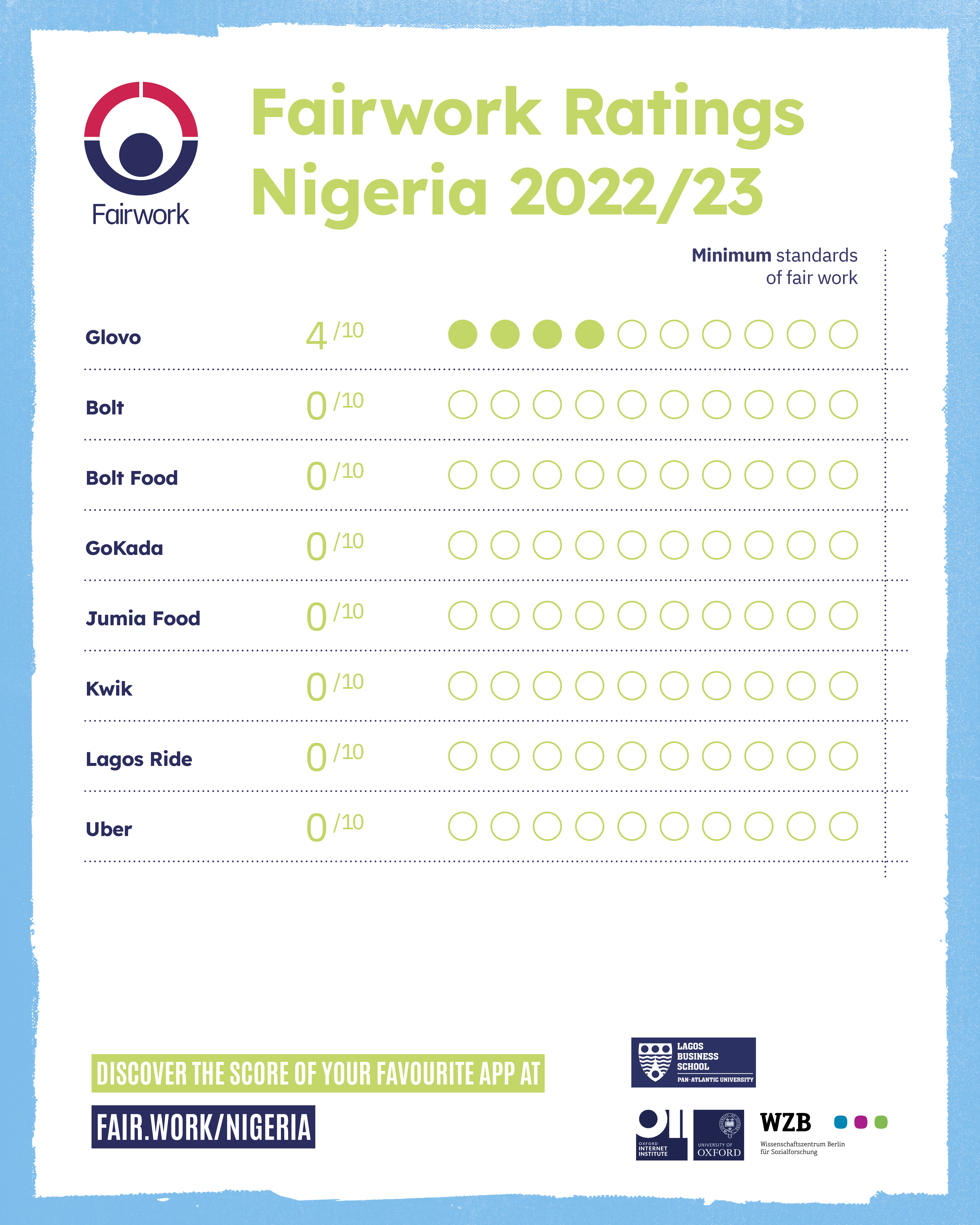New report from the Lagos Business School and the University of Oxford reveals best and worst practices in the Nigerian platform economy

The growth of the platform economy and labour platforms that facilitate work provides economic opportunities to a growing number of workers. Using five principles, the Fairwork project annually evaluates and scores the working conditions of digital platforms to ensure basic minimum standards of fairness for platform workers.
Project teams across 38 global markets conduct Fairwork project scoring, providing an independent perspective on the labour conditions of platform work, and enabling policymakers, platform companies, workers and worker associations, and consumers to make informed decisions. The goal is to show that better and fairer jobs are possible in the platform economy. With a growing network of researchers currently rating platforms in 38 countries across five continents, the Fairwork project collaborates closely with workers, platforms, advocates, and policymakers in every country to promote a fairer future of platform work.
In Nigeria, our Fairwork Observatory report in 2021 found that ride-hailing platforms are struggling to make ends meet because of a rise in inflation, increased cost of living, and poor working conditions. Because platforms classify platform workers as independent contractors, they lack basic labour standards such as a provision social security, safety nets, recourse for grievances, and fair contractual terms. This report highlights the urgent need for better working conditions and social welfare support for platform workers in Nigeria.
Lead researcher Professor Olayinka David-West said: “Our inaugural report scores platform companies in the ride hailing, food delivery and courier services sectors and their treatment of workers across the five Fairwork principles. Of the eight platform businesses, Glovo, with a score of 4 (out of 10) points, is Nigeria’s top-scoring platform. By spotlighting the need for fairness and justice for platform workers, this report will guide policymakers, workers and worker associations, and customers who use these platforms towards improving the rights and working conditions of platform workers.”
Co-Lead Dr. Kemi Ogunyemi observed that “the location-based platform economy could contribute to achieving the goal of poverty alleviation (SDG 1) in Nigeria if the platforms in this space increase their levels of self-regulation and corporate ethos to bridge equity gaps that are not externally legislated – for example, moving towards ensuring platform workers earn a living wage and have access to protections from exposure to unsafe working conditions. We are at the beginning of Fairwork’s interaction with platforms operating in Nigeria and we hope that our engagement with them will enrich the ecosystem for all stakeholders by fostering higher scores on the five Fairwork principles and leading to increased customer support for the platforms.”
Ratings

Key findings
- Out of the eight platforms, only Glovo provided sufficient evidence of workers earning above the minimum wage of N30,000 a month and above the implied hourly mininum wage of N173.08 after work-related costs. Some workers are earning below these thresholds due to work-related expenses, high inflation, and differing individual earnings. None of the platforms showed an effective mechanism or policy to ensure they met these thresholds.
- Out of eight platforms, only Glovo provided sufficient evidence of policies that mitigate against the risk of executing deliveries. These included providing safety gear such as helmets, raincoats and effective SOS buttons None of the eight platforms could show income security for drivers unable to work because of sickness or non-accident related reasons.
- Of the eight platforms evaluated, , only Glovo provided evidence of clear and transparent terms and conditions (T&C) that are subject to Nigerian law. For the second point, we did not receive sufficient evidence that any of the platforms include liability or exclude unfair clauses in their T&Cs
- Glovo also provided evidence of due process for decisions affecting platform workers in the form of effective communication channels and appeals processes. However, there was insufficient evidence that any of the platforms ensured equity in the management process by implementing anti-discrimination policies, removing barriers to underrepresented groups such as women, or other proactive policies
- No platform was able to provide sufficient evidence to ensure freedom of association and collective worker voice. We could not find evidence of any platform recognising an independent collective body of workers or trade unions. As far as we could tell, workers did not have a say in decisions affecting their working conditions nor access to mechanisms facilitating collective bargaining.
What can I do? The Fairwork Pledge
As part of Fairwork’s commitment to making platforms accountable for their labour practices, we have launched the Fairwork Pledge. This pledge aims to encourage other organisations to support decent labour practices in the platform economy, guided by the five principles of fair work.
Organisations like universities, schools, businesses, investors and charities that make use of platform labour can make a difference by supporting platforms that offer better working conditions.
Organisations have the option to sign up to the Pledge as an official Fairwork Supporter or an official Fairwork Partner. Those signing up to be a Supporter must demonstrate their support for fairer platform work publicly and provide their staff with appropriate resources to make informed decisions about what platforms to use. Becoming a Fairwork Partner entails making a public commitment to implement changes in their own internal practices, such as committing to using better-rated platforms when there is a choice.
More than 40 organizations, including GIZ, Solidarity Center, Learning Lions, WZB Berlin Social Science Center, and FES, have already signed the pledge. Join them in demanding a fairer future of work!